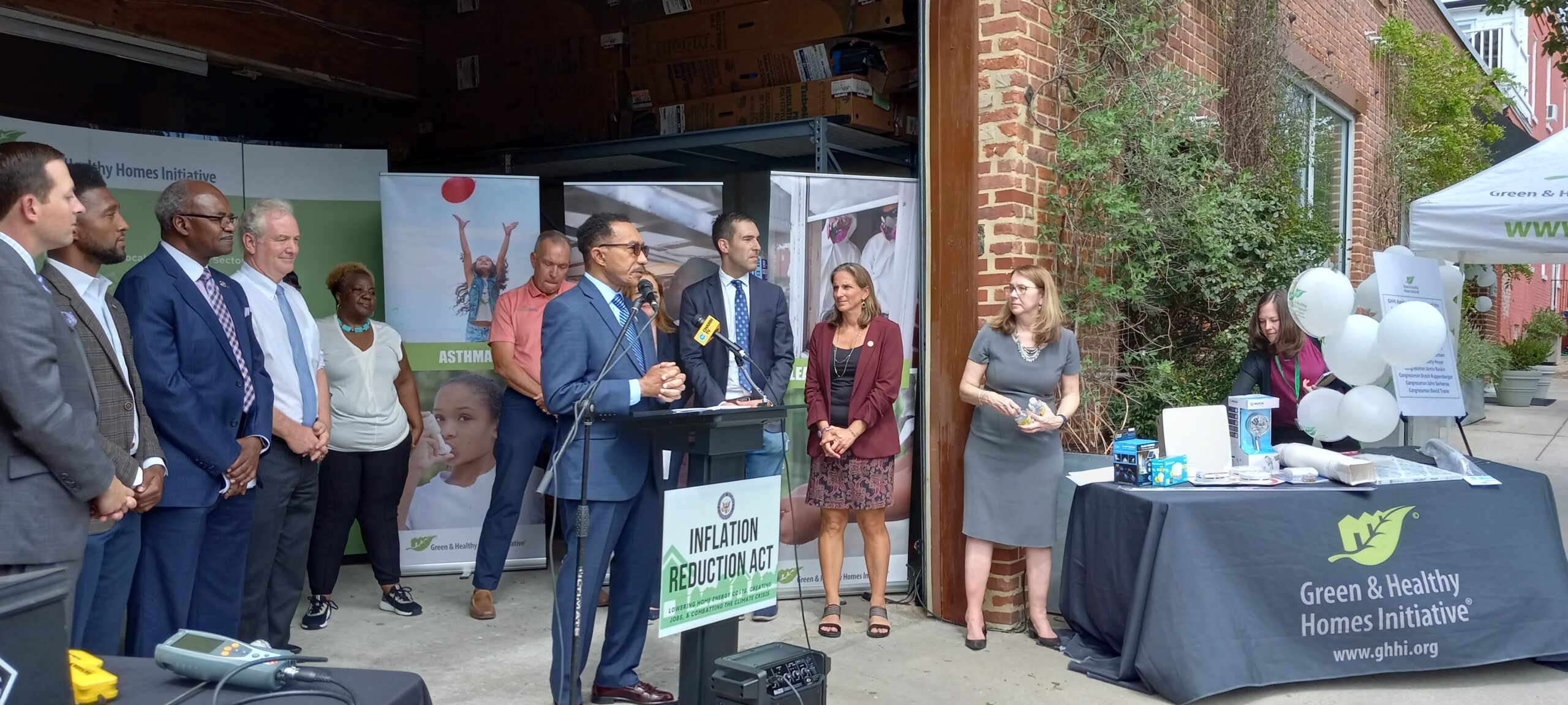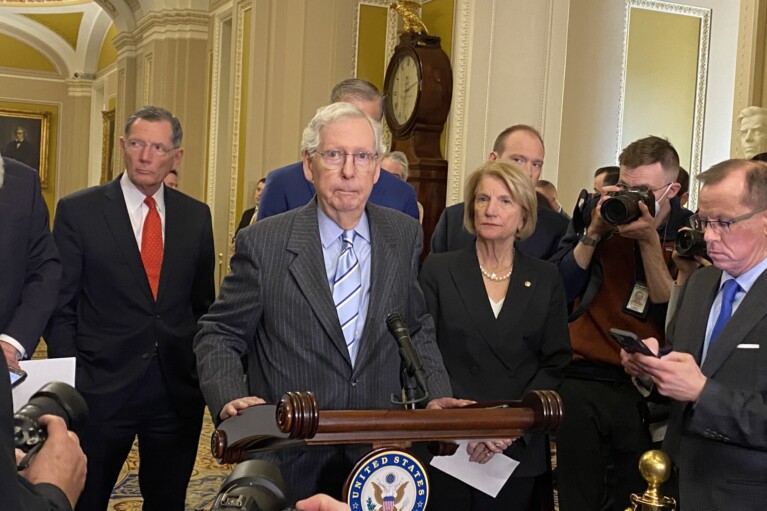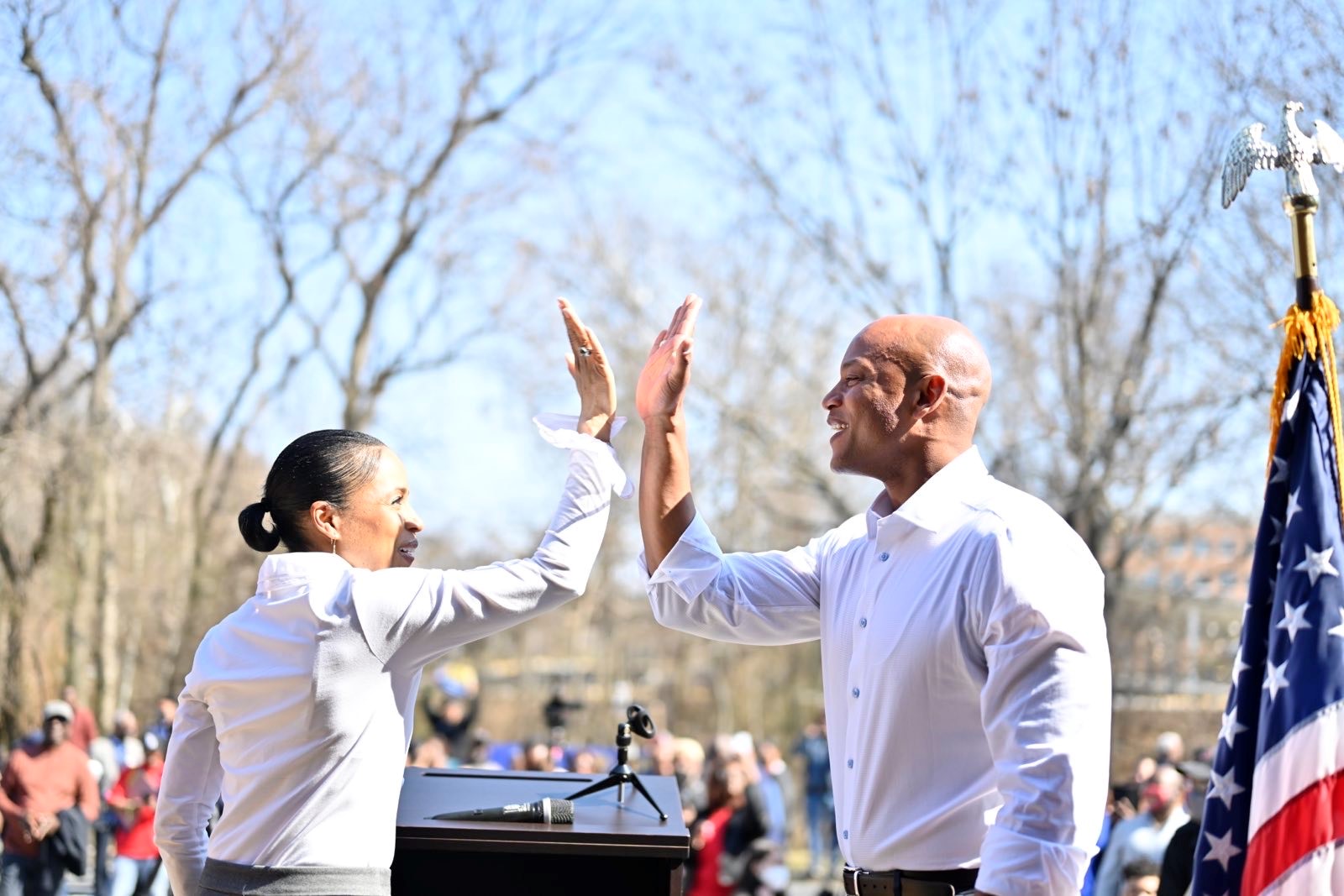Officials: Incentives in federal bill will jump-start home retrofits to address climate change

Even before President Biden signed sweeping health care and climate legislation Tuesday, Maryland Democrats were touting its multiple benefits.
On Monday, several officials came to the headquarters of the Green & Healthy Housing Initiative, a national organization based in Baltimore’s Canton neighborhood, to talk about how the legislation can help reduce greenhouse gas emissions in homes across the state.
The broad Inflation Reduction Act, which Biden signed into law Tuesday afternoon, includes legislation from U.S. Sen. Chris Van Hollen (D-Md.) called the Hope for HOMES Act. That measure provides tax rebates and other incentives for homeowners to retrofit their homes to reduce carbon emissions and also makes money available for community organizations to create job training programs for contracting companies that do home repair and rehabilitation work.
Several officials said the initiative will be especially beneficial to low- and moderate-income homeowners, who often aren’t able to afford upfront costs associated with making their homes more environmentally friendly and energy efficient, like converting their homes from gas heat to electric.
“This is all about trying to help homeowners as we seek to address climate change,” Van Hollen said.
“Energy wasted is money wasted,” he added. “But the biggest impediment to a homeowner is the upfront costs. Obviously, over time, the savings outweigh the expenditures.”
The Inflation Reduction Act provides $4.3 billion for home energy performance-based rebates, supporting homeowners’ ability to reduce their energy costs. Low- and moderate-income households will receive increased rebates, based on estimates that they will work out with state energy offices like the Maryland Energy Administration. The legislation also includes $200 million to help develop the training programs for contractors.
Homeowners may receive up to $2,000 or 50% of the project cost per building that produces energy savings of at least 20%. They may receive up to $4,000 or 50% of the project cost per building that produce energy savings of at least 35%, incentivizing the deeper retrofits that can save families up to $750 annually.
Lower-income families would receive stronger incentives. Low- and moderate-income households may claim up to $4,000 or 80% of the project cost for the projects that will produce at least 20% of energy savings, and up to $8,000 or 80% of the project cost for the same amount up to 35% of energy savings.
Owners of multifamily dwellings may receive rebates of $200,000 or $400,000 depending on the size and projected energy savings of their projects.
With Biden’s signature on the Inflation Reduction Act, these provisions go into effect immediately, and it’s up to U.S. Department of Energy – which will administer funds for the program – to work on guidance for states, which will then be eligible to submit applications to the program.
In Maryland’s case, the Maryland Energy Administration will submit an implementation plan for DOE to review. The state energy offices will then carry out the programs – including setting up the mechanisms to help people track their energy usage and look up qualified contractors, as well as establish the contractor training programs.
Rep. Kweisi Mfume (D-Md.) described the legislation as “doing what’s right to help the people.”
“For a lot of people, their dignity is tied to their house,” he said – and Marylanders will take pride in knowing their homes are playing a role in stemming climate change.
Also on hand in Baltimore were state and local officials who said the federal legislation shows how the various levels of government are able to cooperate to combat climate change when the their leaders are committed to collaboration.
“We have the best congressional delegation that a mayor can have,” said Baltimore Mayor Brandon Scott (D). Scott said the legislation shows “the world that America will not continue down the road of environmental harm.” But he also noted that the measure only touches a fraction of the city’s ambitions for combating climate change.
“We know that this is just a beginning and our work is entirely cut out for us,” he said.
State Senate President Bill Ferguson (D-Baltimore City), whose district includes Canton, called the homeowner program “a really big deal” and said it is the type of initiative that can reassure individuals they have a role to play in working to stem climate change, even when “sometimes it feels too big.”
“People want to be part of the solutions, but sometimes it just costs too much,” Ferguson added.
Also appearing at the news conference: Baltimore City Councilmember Zeke Cohen (D), who also represents Canton and environs, and state Delegates Ben Brooks (D-Baltimore County) and Lorig Charkoudian (D-Montgomery), key clean energy advocates on the House Economic Matters Committee (Brooks is heavily favored to win a state Senate seat in November).
“This is a great deal,” Brooks said of the legislation. “I tell people that Stevie Wonder could see this.”
The Green & Healthy Homes Initiative, which has been around in one form or another since 1986, doesn’t just promote energy efficient homes. It also works on projects like eradicating lead paint from rental units, home weatherization programs, and providing assistance to low-income families struggling with their energy bills. Its headquarters, where Monday’s news conference was held, is a converted warehouse that has office space but also stories supplies for various home improvement projects across the region.
The group’s current board chair, who was on hand Monday, is Joy Thomas Moore, mother of Wes Moore, the Democratic nominee for governor. Several speakers referred to her as “the next first mother of the state of Maryland,” a line that drew lusty applause from the assembled politicians and community activists.




 Creative Commons Attribution
Creative Commons Attribution